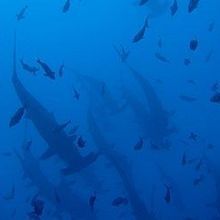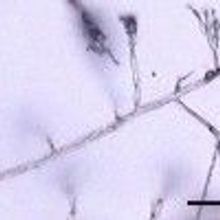Login
Subscribemarine life, ecology

Microplastics in Seawater May Harbor Parasites
Christie Wilcox, PhD | Apr 26, 2022 | 2 min read
Laboratory experiments find that Toxoplasma, Cryptosporidium, and Giardia can congregate on microplastic beads and fibers, suggesting they might make their way into and around the world’s oceans by hitching rides on tiny bits of trash.

Reimagining Ecology, 1939
Lisa Winter | Apr 4, 2022 | 3 min read
Edward Ricketts built his laboratory just onshore from the swirling tidepools of Monterey Bay, California, an ideal backdrop against which he developed a new system for studying the ecology of any given habitat.

Fastest-Ever Cell Contractions Observed in Primitive Invertebrate
Abby Olena, PhD | Dec 13, 2018 | 4 min read
The microscopic marine animal Trichoplax adhaerens may use rapid changes in cell shape to avoid being ripped apart by forces in the ocean.

Marine Protected Areas Aren’t Protected Against Climate Change
Ashley Yeager | May 7, 2018 | 2 min read
If left unchecked, greenhouse gas emissions will drive ocean temperatures up, affecting wildlife in these regions.

Ocean Sunfish Could Offer Clues to the “Rise of Slime”
Ashley Yeager | Apr 1, 2018 | 4 min read
A controversial hypothesis suggests that jellyfish may one day rule the oceans, and Mola mola may tell us if we are approaching a tipping point.

Opinion: Evidence to Support an “Eco-Friendly” Desalination Technology Lacking
Daniel Cartamil | Sep 20, 2016 | 2 min read
Policymakers’ choice of seawater intakes highlights California’s troubling embrace of unproven technologies.

Submerged Pigs Inform Forensics
Jef Akst | Jul 1, 2016 | 5 min read
Watching the decomposition of pig carcasses anchored to the seafloor is helping forensic researchers understand what to expect of human remains dumped in the ocean.

Well-Brined Pork
The Scientist | Jun 30, 2016 | 1 min read
Watch what happens when marine organisms have their way with a sunken pig carcass.

Identifying Resilient Reefs
Jef Akst | Jun 16, 2016 | 2 min read
Researchers identify areas where marine ecosystems are faring better or worse than predicted in hopes of saving the world’s corals.

Capsule Reviews
Bob Grant | May 1, 2016 | 4 min read
Sorting the Beef from the Bull, Cheats and Deceits, A Sea of Glass, and Following the Wild Bees

Study: Small Fish Comforted By Big Predators
Tanya Lewis | Apr 28, 2016 | 1 min read
Baby fish show fewer signs of stress in the presence of large fish that scare off midsize predators.

Settlement Signal
Abby Olena, PhD | Jan 9, 2014 | 3 min read
A marine bacterium generates contractile structures that are essential for the metamorphosis of a tubeworm.

Old Ocean Mold
Beth Marie Mole | Dec 12, 2012 | 1 min read
Fungi in 100 million year-old seafloor sediments could possess novel antibiotics.
West Coast Marine Threat
Cristina Luiggi | Jun 18, 2012 | 1 min read
Rising ocean acidity along the California coast may wreak havoc in the region’s oyster populations.
Ocean Plastic Aid Insects
Cristina Luiggi | May 10, 2012 | 1 min read
Floating pools of plastic debris in the Pacific offer more surfaces for marine insects to lay eggs.

Newly Discovered Species
N/A | Oct 1, 2011 | 1 min read
Life on Earth is mind-bogglingly diverse with estimates of the number of existing species in the tens of millions. Over the last 4 billion years, many species have gone extinct; and because of the actions of humans, many existing species are now endangered.
